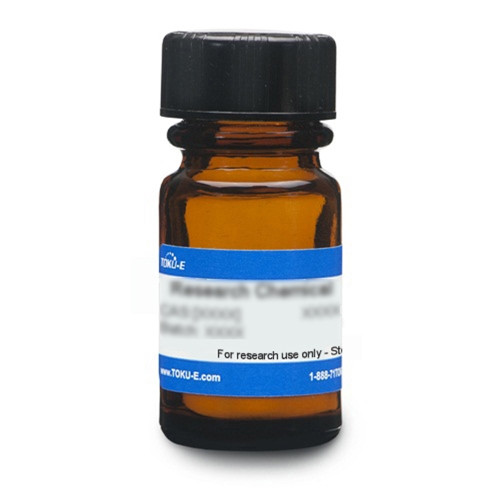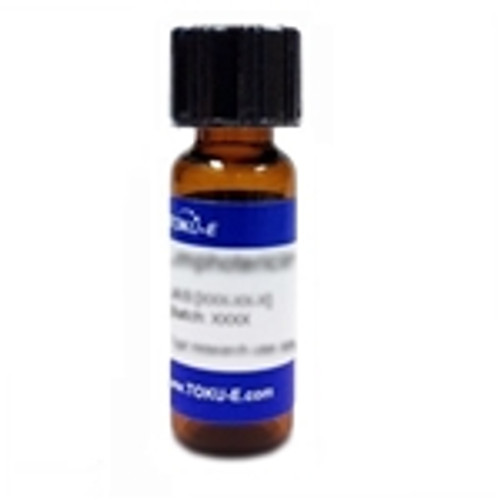Nisin Z is a natural bacteriocin polypeptide antibiotic known as a lantibiotic. It is a 34-amino acid polycyclic antibacterial peptide. Nisin Z and Nisin A (Nisin) are two naturally occurring variants of Nisin that are produced by fermentation of Lactococcus lactis and they differ by a single amino residue at position 27: In Nisin Z, it is asparagine and in Nisin A it is histidine. Nisin Z is soluble in water at neutral and higher pH values, with similar solubility to Nisin A. However, it has lower solubility than Nisin A at low pH values.
Nisin is a proteinaceous toxin produced by Gram-positive bacteria to reduce competitive strain from other Gram-positive bacteria and it has bactericidal properties. It is used as a selective agent in microbiological media to isolate Gram-negative bacteria, yeast, and molds. It commonly used a food additive to prevent spoilage.
Nisin Z has been found to have anti-cancer properties in skin cancer model systems. It has also found promise as a natural alternative to conventional antibiotics in the ethanol industry.
We also offer:
- Nisin A (N013)
| Mechanism of Action | Nisin disrupts the cytoplasmic membrane via binding to the Lipid-II wall precursor to influence cell wall synthesis and us it as a docking molecule to form short-lived pores (2-2-5 nm) that are only stable for seconds, but can change the membrane potential, allowing an influx of ions, leading to cell death. In studies with HNSCC cells, researchers found Nisin acts through the cation transport regulator homolog 1 (CHAC1) and through a CHAC1-independent influx of extracellular calcium. |
| Spectrum | Purified Nisin Z was found to have antibacterial activity against both Gram-positive and Gram-negative bacteria |
| Microbiology Applications | Nisin is derived from culture on natural substrates such as milk or dextrose, since the chemical synthesis of this peptide is not cost-effective for industrial and large-scale applications. It can be used in food safety as a food additive to prevent spoilage. Nisin is used as a selective agent in microbiological media to isolate Gram-negative bacteria, yeast, and mold. |
| Eukaryotic Cell Culture Applications | In vitro studies have shown that Nisin can modulate the innate immune system by causing the secretion of chemokines and suppressing LPS stimulated cytokines. |
| Cancer Applications | Nisin Z induces selective toxicity and apoptotic cell death in cultured melanoma cells. The anti-melanoma potential of Nisin Z was evaluated in vitro. It induced selective toxicity and negatively affected the energy metabolism (glycolysis, mitochondrial respiration), increased ROS and caused apoptosis. It can also decrease the invasion and proliferation of melamona cells (Lewies et al, 2018).
Nisin ZP, a naturally occurring variant, was found to have anti-cancer properties in studies with four human head and neck squamous cell carcinoma (HNSCC) cell lines: UM-SCC-17B (supraglottis/soft tissue-neck), UM-SCC-14A (floor of mouth), oral SCC cell lines from tongue (HSC-3 and OSCC-3). Nisin ZP induced apoptosis via a calpain-dependent pathway (Kamarajan et al, 2015). Nisin was found to have anti-cancer properties in studies with human head and neck squamous cell carcinoma (HNSCC), inducing preferential apoptosis and cell cycle arrest, and reducing cell proliferation. It can also reduce tumorigenesis in vivo. It exerts these effects through activation of CHAC1, a cation transport regulator, increased calcium influx, and induction of cell cycle arrest (Joo et al, 2012) The effect of Nisin on breast cancer cells was evaluated in vitro to study its cytotoxicity/proliferation using the MTT assay with the cell line MCF-7. It had a high and selective cytotoxicity with an IC50 value of 5 µM suggesting its potential use in breast cancer (Avand et al, 2018). The effect of Nisin on colon cancer was evaluated with colon cancer cells (SW480) and apoptostic effect using MTT assay and real-time PCR to find that it provokes the intrinsic pathway of apoptosis and increases bax/bcl-2 ratio in cancer cells (Ahmadi et al, 2017). |
| Molecular Formula | C141H229N41O38S7 |
| References |
Ahmadi S, Ghollasi M and Hosseini HM (2017) The apoptotic impact of Nisin as a potent bacteriocin on the colon cancer cells. Microb. Pathog. 111:193-197 PMID 28867631 Avand A, Akbari V and Shafizadegan S (2018) In vitro cytototoxic activity of a Lactococcus lactis antimicrobial peptide against breast cancer cells. Iran J. Biotechnol. 16(3):e1867 PMID 31457026 Delves-Broughton, J., Blackburn, P., Evans, R.J. et al.(1996) Applications of the bacteriocin, Nisin. Antonie van Leeuwenhoek 69(2):193-02 Joo NE, Ritchie K, Kamarajan P, Miao D, and Kapila YL (2012) Nisin, an apoptogenic bacteriocin and food preservative, attenuates HNSCC tumorigenesis via CHAC1. Cancer Med 1(3):295-305 PMID 23342279 Kamarajan P et al (2015) Nisin ZP, a bacteriocin and food preservative, inhibits head and neck cancer tumorigenesis and prolongs survival. PLoS ONE 10(7): e0131008 Koczulla AR and Bals R (2003) Antimicrobial peptides: Current status and therapeutic potential. Drugs 63(4):389-406 PMID 12558461 Lewies A, Wentzel JF, Miller HC, and Du Plessis LH (2018) The antimicrobial peptide Nisin Z induces selective toxicity and apoptotic cell death in cultured melanoma cells. Biochimie. 144:28-40 PMID 29054798 Rollema HS, Kuipers OP, Both P, de Vos WM, Siezen RJ (1995) Improvement of solubility and stability of the antimicrobial peptide Nisin by protein engineering. Appl Environ Microbiol. 1995 Aug;61(8):2873-8 PMID 7487019 Ruhl E and Sahl HG (1985) Mode of action of the peptide antibiotic Nisin and influence on the membrane potential of whole cells and on cytoplasmic and artificial membrane sesicles. Antimicrob. Agents Chemother. 27(5): 841-845 PMID 4015074 |







